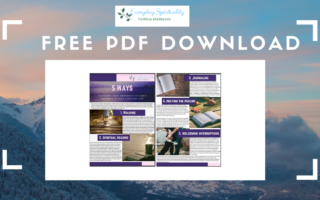We live in a world that tells us we are not enough. The message you are not enough accompanied by the message you don’t have enough is so pervasive in our culture that if we are inattentive to our interior lives, we will let these messages inform our decisions and the way we function in the world. I find that because these messages have taken root in my being, if I am not careful, they sometimes inform the way I read scripture.
Psalm 62 begins with these words, “My soul rests in God alone, from whom comes my salvation.” I have always felt challenged by these words. There are so many moments in my day when I am pulled away from resting in God, so many tasks for me to do and to remember, so many discussions with so many people raising questions and problems I need to address, that I find myself wondering at the end of the day, if I have been sufficiently attentive to my life with God.
My recent study of Psalm 62 has led me to see that I have been missing the true meaning of these words. I have been reading the words through a presupposition that says I am not enough and consequently seeing these words as a challenge when in fact they are words of comfort. I have been reading the words as a task to accomplish when instead, they point to surrender. This psalm speaks to those called to a monastic life of prayer and contemplation, but it also speaks to those of us struggling to live for God amid our everyday busy and challenging lives.
When we are operating from perspectives that are assumed and not articulated, it is hard to open our eyes to a new way of seeing. The psalms were written in Hebrew and translations from Hebrew to English vary. Theologian Robert Alter’s translation of Psalm 62 awakened me to my need for a new perspective on the psalm. Alter’s translation of the opening line and verse 6 of the psalm worked together to lead me to a new way of seeing. In Alter’s translation, the lines read,
Only in God is my being quiet. From Him is my rescue.
Only in God be quiet, my being, for from Him is my hope.
Verses 2 and 6
Psalm 62
I had been reading these verses of the psalm as a commitment I was making to God, as a dedication of my heart to rest only in God, and for that reason, I consistently felt that I failed to dedicate my heart as fully to God as the psalm suggests. The wording in Alter’s translation reads as an observation of a fact, the psalmist realizes that the only place of quiet for him is in God because God is the source of his salvation and the source of his hope. Rather than worry that I have not dedicated myself fully enough to God, these words ask me to recognize that I have a place of rest, quiet, silence in God’s presence. Furthermore, knowing that it is only in God’s presence that I have a place of rest, quiet, and silence, the psalm tells me to return to God if I find myself overcome by anxiety. The psalm tells me that trusting God is my security.
One study I read illustrated the trust articulated in Psalm 62 through an image of trust expressed in Psalm 131. Psalm 131 has always been a favorite of mine because it uses the image of a weaned child with its mother to illustrate trust.
Rather, I have stilled my soul. Like a weaned child to its mother, weaned is my soul.
verse 2
Psalm 131
As a mother, I remember so well the experience of comforting my own distraught children. I remember picking them up and holding them on my lap, gently restraining their flailing, tension filled bodies and gradually feeling the tension melt away until they rested against me in a silent, still expression of trust.
This image helps me to understand what Psalm 62 is saying to me. Psalm 62 is saying that I can trust God like my children could trust me. I have a place of silence and stillness that is not far away but very near me, a place I simply have to remember to return to, the place of God’s presence that formed me in my mother’s womb, and is continually drawing near to me. I can find that place by letting go of the noisy external and internal voices of anxiety that seem to surround me on all sides and instead attune my heart to the voice of God waiting for me in the silence and stillness of my heart. This psalm recognizes that I am not enough on my own, but unlike the cultural messages that ask me to be more, do more, and get more, this psalm tells me that my insufficiency, though a given, is welcomed by God. My insufficiency is the source for turning continually toward God and finding in God the source of my salvation, the source of my hope, and the source of my life.













